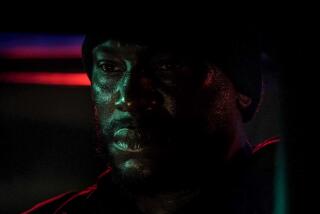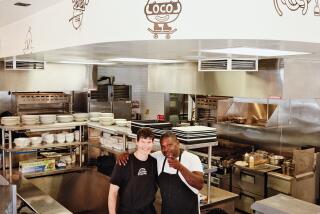Mr. Underwood Goes to Watts : TNT’s ‘Heat Wave’ Stars ‘L.A. Law’ Actor in the Retelling of 1965 Riots
- Share via
Blair Underwood doesn’t remember the long hot summer of 1965 when racial tension in Los An geles culminated in the brutal Watts riots.
“How old do you think I was?” he asks.
Perhaps 2, the listener guesses.
“I was 1, “ Underwood says with a sly smile.
Twenty-five years after those uprisings, Underwood is starring with James Earl Jones, Cicely Tyson and Sally Kirkland in “Heat Wave,” a drama about the riots that premieres Monday at 5 p.m. on the TNT cable network. TNT shows “Heat Wave” again Monday at 7 p.m., 9 p.m. and 11 p.m., and several other times throughout the month.
Shot on location in Watts and Beverly Hills, “Heat Wave” focuses on Robert Richardson (played by Underwood), a young black ad messenger for the Los Angeles Times who was assigned to report on the Watts riots because white reporters couldn’t safely cover the story.
“Heat Wave” marks the second time this year that Underwood--who is about to begin his fourth season on NBC’s “L.A. Law” as the slick, self-confident attorney Jonathan Rollins--has starred in a TV movie about a watershed incident in recent black-American history.
In January, he appeared in the NBC drama “Murder in Mississippi,” playing James Chaney, who was murdered with two other civil rights activists in 1964. “I would rather do something that has a message to it,” he says. “ ‘Heat Wave’ has political and historical overtones. Both (movies) are important pieces of history.”
It was an uphill struggle for Underwood to get cast in “Mississippi” because of his sophisticated “L.A. Law” image. Just the opposite happened with “Heat Wave.” “They (the producers) just came to me--which is a new thing,” he says. “It never happened before. Probably my work in ‘Murder in Mississippi’ had something to do with them coming to me.”
Underwood admits he knew very little about the Watts riots before “Heat Wave.”
“I had to do a lot of reading and talking to people who were around at that time in Watts,” he says. “Everybody has a different opinion on what happened. Some were happy we were making the movie. But the question I kept hearing was, ‘Why tell the story now? It’s something we shouldn’t celebrate, it’s something we should forget.’ ”
The actor tends to agree that “Heat Wave” can refocus attention on the plight of those who lived 25 years ago. Yet, he says, “It’s still relevant today. But I have no idea how this movie will be received.”
Conditions in Watts, Underwood believes, have gotten even worse since that heated summer. “The same grievances and questions haven’t been answered,” he says. “The reason I say it’s much worse today is because we live in a much more violent society. In the five weeks of filming this movie in and around South-Central and East Los Angeles, we had 12 drive-by shootings within two blocks of the set. It’s still very much a war zone and the gangs run the streets.”
As for “L.A. Law,” this past season was a pivotal one for Jonathan Rollins. He spent more time in court trying cases, fell in love with a beautiful divorcee and nearly quit the firm when he learned a client had dealings in South Africa.
“It was great for my character,” Underwood says. “It’s always good if a character can grow and develop. It’s not good for a character to just stagnate and sit there.”
It was producer Steven Bochco’s initial plan to establish Rollins’ character during the first two seasons. “Once that was established we would see another side of him,” Underwood says. “He is black and certain things will happen to him because of his race. Let’s see how he reacts.”
Underwood is excited about the upcoming season. “It’s going to be good stuff,” he says, rubbing his hands together. “They have five or six writers this year who are all brand new. That will be good. I wouldn’t want to wish that job on my worst enemy. First of all they have to maintain the level of quality of the first season and juggle 13 or 14 cast members and make it all work.”
In his free moments, Underwood and his writer brother, Frank, manage their own production company. “We have a couple of projects we are working on right now,” he says. “There are so many stories that haven’t been told that can be about black history. If I can have a say-so or if I can initiate those projects . . . That’s where my head is now.”
More to Read
The complete guide to home viewing
Get Screen Gab for everything about the TV shows and streaming movies everyone’s talking about.
You may occasionally receive promotional content from the Los Angeles Times.







